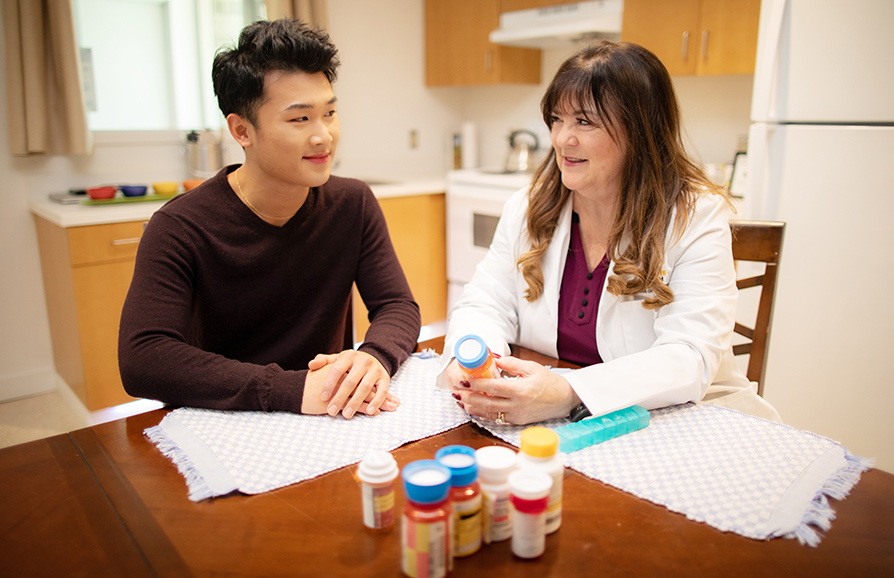A mind to teach, a heart to serve
Family Caregiving Institute Professor Deb Bakerjian’s personal experiences fuel her professional impact

Deb Bakerjian demonstrates how to provide a medication consultation for family caregivers. She says caregivers are health providers best partners in care.
Intensive Care Unit (ICU) nurse. Army reservist. Business owner. Family caregiver.
Deb Bakerjian’s experiences in multiple facets across her career shape her caregiving research and guide her education innovations.
Early in her nursing career, she floated to an ICU shift. Shortly after, she ended up in the ICU caring for someone very close to her. The personal and professional collided and illustrated the problems she’s been working to improve for more than 25 years.
“I realized a lot of patients, particularly the older ones, were coming back to the ICU and we couldn’t do much for them. They needed better preventive care earlier on,” Bakerjian, a professor in the Family Caregiving Institute at the Betty Irene Moore School of Nursing at UC Davis. “That really drove me to think about a change in what I was doing. That drove me to look for something else.”
Bakerjian earned her certification as a nurse practitioner from UC Davis in 1989. Then, the Army, where she was a reservist, called her into active duty as an active guard reserve position. For three years, she served as an operations and training officer while assisting physicians in San Jose on their rounds in nursing homes.
“I realized I really liked taking care of older adults. I also saw the challenges of providing high quality care for older adults, as a nurse, in nursing homes,” she explained.
She also discovered she enjoyed partnering with an interprofessional team of health care providers. She formed a practice with a team of nurse practitioners and physicians, where she handled billing, oversaw regulatory requirements and, ultimately, identified the root cause of nursing home problems — policy.
After earning her Doctor of Philosophy in Health Policy and Gerontology in 2006 from the UCSF School of Nursing, she had the tools to lead research to improve the quality of care for aging populations.
Her expertise proved valuable during the pandemic. COVID-19 resident infection rates and deaths from COVID-19 exposed the vulnerabilities of this population and the ineffectiveness of the long-term care industry.
“It was horrible for older adults in nursing homes and the nurses who were demoralized from what they witnessed,” she said. “As horrible as it was, this is our opportunity to take advantage of that and make a difference for the future. All of these people should not die in vain.”
Bakerjian’s recent articles, including “The Importance and Impact of Nurse Leader Engagement With State Nursing Workforce Centers: Lessons From the COVID-19 Pandemic” and “The Advanced Practice Registered Nurse Leadership Role in Nursing Homes: Leading Efforts Toward High Quality and Safe Care," explore the adverse impact of the COVID-19 pandemic on the nursing workforce and outline the leadership role of advanced practice registered nurses in the care of older adults who live in nursing homes. She also examines the role of family members who care for these older adults who, according to Bakerjian, are “your best partner” in care.
“If you can develop that relationship off the bat, it makes a really big difference,” she said. “My life experiences really helped me to understand that.”





